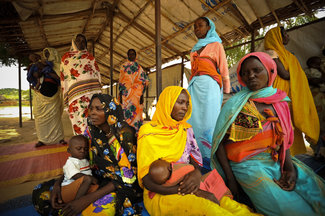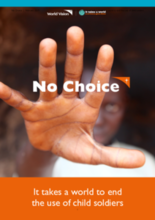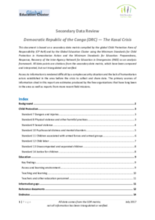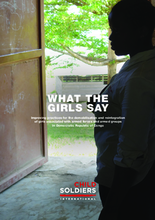

Displaying 11 - 20 of 102
This paper examines all policy and laws related to families in the South, West, East and Central regions of sub-Saharan Africa.
The special issue of Emerging Adulthood titled “Care-Leaving in Africa” is the first collection of essays on care-leaving by African scholars. This article, coauthored by scholars from North and South, argues in favor of North–South dialogue but highlights several challenges inherent in this, including the indigenizing and thus marginalizing of African experience and scholarship and divergent constructions of key social concepts.
World Vision commissioned the research, 'No Choice', to better understand children associated with armed groups.
This study employed a strict textual analysis of the relevant literature on the use of child soldiers in the Democratic Republic of Congo, South Sudan, and the Central African Republic to understand the implications of this on regional security.
This article critically examines Ritualistic child sexual abuse (RCSA) as a predatory form of child maltreatment and the lack of relevant child welfare interventions in the DRC to address it.
The authors of this study investigated the incremental impact of adding a caregiver component to a life skills programme for adolescent girls, assessing girls’ exposure to violence (sexual and others) and caregivers’ gender attitudes and parenting behaviours.
This chapter from the book Resilience and the Re-integration of Street Children and Youth in Sub-Saharan Africa is comprised of two studies. The first study provides an analysis of the psychological situation of street children and youth in Yaoundé and Douala, while the second one deals with resilience building within a rehabilitation home.
This chapter of Child Maltreatment in Residential Care describes Interaction Competencies with Children – for Caregivers (ICC-C), a preventative intervention approach to improve the quality of care and reduce the incidence of maltreatment within institutional care settings in Sub-Saharan Africa.
This document is based on a secondary data matrix compiled by the global Child Protection Area of Responsibility (CP AoR) and by the Global Education Cluster using the Minimum Standards for Child Protection in Humanitarian Action and the Minimum Standards for Education: Preparedness, Response, Recovery of the Inter-Agency Network for Education in Emergencies (INEE) as an analysis framework.
This report presents the findings of research conducted by Child Soldiers International to assess the effectiveness of release, psychosocial recovery and reintegration interventions for girls associated with armed groups in eastern Democratic Republic of Congo (DRC).



